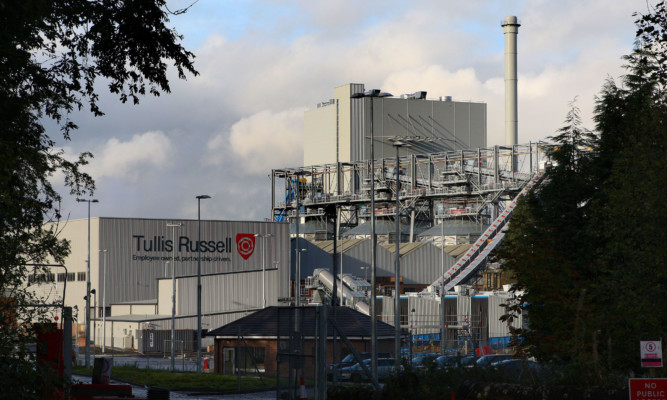Fears about the community impact of the UK’s biggest biomass power station are being collated on a new website.
People living in the shadow of the 65-megawatt plant in Markinch claim it is having an intolerable effect on their health and the environment.
Despite ongoing monitoring by the Scottish Environment Protection Agency (Sepa), neighbours have been complaining about excessive noise, light pollution and emissions from the incinerator.
Opponents say the storage of huge piles of woodchip to fuel the facility is creating clouds of dust. People living as far afield as Cardenden and Methil claim to have been affected.
Operated by Rwe Innogy, the biomass plant was commissioned by Markinch papermaker Tullis Russell to power the factory. It was hoped it would cut electricity bills by enough to safeguard hundreds of jobs.
However, concerned residents have now joined forces with environmental organisation Biofuelwatch to create a website www.markinchbiomassconcerns.co.uk where they can share their experiences.
They believe a collective body of evidence will have a bigger impact than individual complaints and hope it will ensure continued monitoring by Sepa.
A number of issues associated with the plant were outlined at a packed public meeting in Markinch on Monday night, where Sepa representatives attempted to address concerns.
People spoke of being woken in the middle of the night by noise from reversing vehicles and steam venting. They questioned why the factory was not properly screened from view and why large lights needed to be left on all night.
Speaking on behalf of the Cardenden community, community council chairman Dave Roy said residents were being choked by wood dust which descended like snow on the village.
“There have been shutdowns at the biomass plant so they’ve not needed as much fuel,” he said.
“Despite this, they’ve continued to stockpile more and more woodchips and sometimes when you go outside it’s like walking through a storm.
“The wood is piled up like the pyramids of Giza. People are very worried about the effect this is having on their health.”
Sepa’s site manager, David Fisher, said residents would begin to notice an improvement in noise levels in the next month. He explained the plant had been undergoing testing and had been shut down at weekends.
Excess noise was created every time the incinerator was restarted.
“We anticipate that by the end of this year it will be on normal running and there will be no regular noisy shutdowns and start-ups,” he said. “We expect it will happen just once or twice a year, when Tullis Russell has its annual shutdowns.”
Mr Fisher offered an assurance that Sepa would carry out regular checks on the site and would complete an annual audit to ensure EU standards were being met.
He said operations would also be audited externally. He added: “The company is extremely incentivised to make sure this thing works well.
“I think it works as it’s supposed to now but it’s taken a long time.”
A spokesman for Rwe Innogy said it was committed to ensuring any difficulties were kept to a minimum.
“We take our responsibility to the community very seriously and have kept an open dialogue going with local people, a fact that was recognised during the discussion at this latest public meeting,” he said.
“This meeting was focused on how Sepa monitors and regulates the Markinch CHP plant. Our focus, working with partners and agencies such as Sepa, is ensuring that the long-term community benefits from the CHP plant are maximised and that any short term difficulties brought about by the commissioning process are minimised.”
